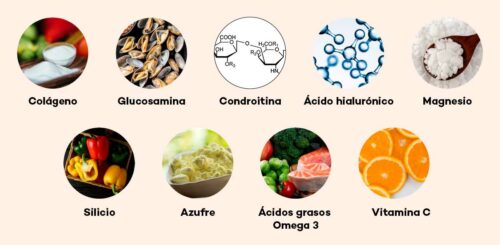The Dr. Patricia Márquez Rodríguez, Head of the Physical Medicine and Rehabilitation Service at San Roque University Hospitals in Las Palmas de Gran Canaria, tells us the importance of keeping the joints in good physical condition.

It's never too late to start taking care of our joints
Importance of keeping joints in good physical condition
Joints are complex structures, designed to support weight and move the body through space., which are made up of bones, muscles, synovial membrane, cartilage and ligaments.
The joints most affected are the knees, lumbar, hips, ankles, cervical, shoulders and wrists., since they are continually under tension and in motion. These have a limited resistance to loads and repetitive movements, deteriorating over time.
Thus, To avoid the appearance of pain in the joints, it is very important that they are in perfect condition in order to perform a correct function.
How to take care of our joints
Joint health largely depends on eating habits and our lifestyle. There are factors that can negatively affect to her, like obesity, he sedentary lifestyle, the intense practice of impact sports activityor, of course, the age.
Luckily, with a proper diet, With specific supplements, a practice of regular physical activity and a good night rest, we can considerably influence keep joints in good condition.
Recommendations for the use of nutritional supplements for joint well-being
The nutritional supplements for joints are a great support for the diet to keep them healthy, strengthen and protect them.
There are numerous supplements, among which I recommend:
Collagen
He collagen It is the most abundant protein in our body and one of the main components of the joints, constituting a quarter of the muscle mass. It is a protein that we can find in the skin, muscles, tendons, cartilage, nails and hair.
If you don't know what collagen is for, its main function is provide flexibility, elasticity and support.
There are different types depending on their location:
Collagen type 1: It is the one that provides flexibility and elasticity to tissues. It is found in bones, tendons and skin.
Collagen type 2: This type of collagen is present in cartilage, conferring resistance.
Glucosamine
The glucosamine It occurs naturally in our body. However, as the years passed, is decreasing.
It is found around the joints and its main function is to protect the bone. It is used to repair damaged cartilage tissues and stimulate its production and regeneration.
Chondroitin
The chondroitin It is a very important component of cartilage, since intervenes in its construction and regeneration.
Acts as a shock absorber in the joints, improving joint movement by giving greater elasticity to the cartilage.
Hyaluronic acid
He hyaluronic acid It is another of the nutrients that intervenes in collagen production and? acts as a shock absorber, lubricating the joints and reducing the friction of physical exercise.
Magnesium
He magnesium, especially the magnesium citrateIn addition to being essential, it turns out to be perfect for combat joint pain.
Magnesium facilitates the assimilation of calcium and helps eliminate deposits that accumulate in the joints and that, in many cases, are the cause of diseases such as arthritis.
Also, improves absorption of other essential minerals for bones such as silicon, fluorine, sodium and phosphorus and intervenes in the amino acid metabolism, which form the collagen blocks that make up bones.
Silicon
He silicon participate in the synthesis of elastin and collagen and stimulates bone formation and mineralization.
Sulfur
He sulfur We find it in collagen, and it is responsible for form tendons, cartilage and ligaments.
Calcium and phosphorus
He calcium and the match intervene in the formation, development and maintenance of bones and joints.
Omega-3 fatty acids
The three Omega-3 fatty acids main ones are the alpha-linolenic acid (ALA), eicosapentaenoic acid (EPA) and docosahexaenoic acid (DHA).
These have proven to be effective in inflammatory diseases joints by preventing and reducing inflammation in the cartilage, minimizing its wear and increasing its formation.
Vitamin C
The vitamin C contributes to the protection of cells against oxidative damage Yet the collagen formation, for a normal functioning of bones and cartilage.
Vitamin B Complex (B1, B2, B6, B12)
Each B complex vitamin has an effect on different pain mechanisms, in addition to being antioxidants and to produce the maximum benefit on joints.
The action of the vitamins B1, B2, B6 and B12 in the joints is interfere with pain mechanisms, which are activated with the joint degeneration.
Vitamin D
The vitamin D participate in the proteoglycan synthesis and it is of vital importance for the bone metabolism.
Vitamin E
The vitamin E improves cartilage protection.
Boswellia Extract
He Boswellia extract has a powerful anti-inflammatory and analgesic effect, at the same time that improves and increases joint mobility.
Curcuma Longa Powder Extract
In the composition of turmeric powder, the curcuminoids, compounds from the polyphenol family. The curcumin has a powerful anti-inflammatory and antioxidant activity, in addition to protecting chondrocytes from the catabolic effect of proinflammatory cytokines, thus preventing cartilage degradation and therefore helping slow the progression of osteoarthritis.
In order to achieve the maximum benefit from nutritional supplements, they must be associated with a correct diet and physical exercise. This practice should be, at a minimum, 30 minutes daily, combining “impact” activities, such as walking or running, with “non-impact” activities, such as swimming, cycling or Pilates.
Movement relieves joint stiffness, reduces pain and strengthens muscles that surround the joints. All of this must have a correct program and a medical advice.

Dr. Patricia Márquez Rodríguez
Head of Physical Medicine and Rehabilitation Service at San Roque University Hospitals in Las Palmas de Gran Canaria.

















